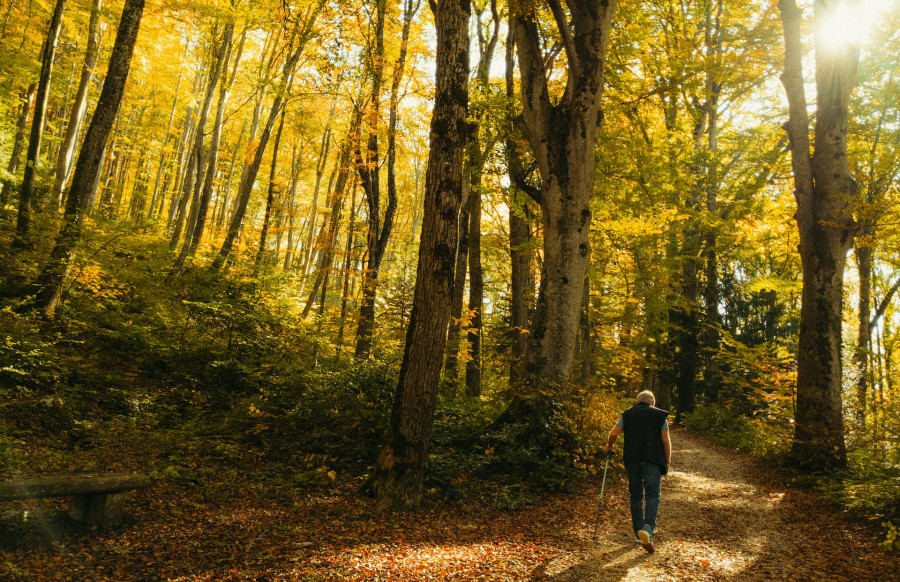Fiction Park
The young-old man
An old man I met on a trekking trail forever changed my view of human existence.
Sandesh Parajuli
I had been walking for an entire day up and down the rocky hills, past raging rivers, lush green forests, quaint ancient villages, abandoned terrace farmlands, pristine lakes, and cascading waterfalls. After crossing the wooden suspension bridge above the Mewakhola river, I met an old man. Despite his advanced age (he looked like he was in his late eighties), he seemed to possess the energy of a young man. While walking with him, I realised that he panted less, took quicker and longer steps than me, and often waited for me to catch up with him. His presence made me feel safe.
Walking past the alpine vegetation, we began to ponder their existence and survival. To my pleasant surprise, my companion turned out to be a highly knowledgeable man. After a few hours of walking together, our discussion topic veered toward life and nature.
“Do you believe in Darwin’s theory of evolution?” asked the old man, turning towards me.
I had read about it since childhood but never questioned if I should believe it. I paused for a few seconds and said, “Seems like I do.”
“Why? What is so convincing about it?” he asked and began to walk slowly.
“Well, because it is more practical than creationism, and if I didn’t believe it, I would still have questions that would have remained unanswered to me, and that would have driven me to some intellectual predicament. So, my belief in the theory is less about its credibility and more about my subconscious tendency to avoid chaos. I think that’s what faith is all about—providing you with answers when you are in a state of crisis,” I said, taking small steps behind him. He was curiously listening.
“So, you blatantly believe what some bald and bearded old man said simply because you are too lazy to think for yourself?” asked the old man, who looked like the classic old Darwin. He had grown a long thick beard, and I could see only a small patch of hair at his back skull.
“Exactly, too lazy in this field,” I laughed and said, “I don’t think I was born to study biology.”
He quickly turned around, looked at me, and then again began walking along the rocky trail. “People spend their entire lives searching for the purpose of their existence. What is it that you actually think you are born to study?” he asked.
“I don’t know. Maybe physics, mathematics, and literature, and do something memorable in those fields. But I never saw myself taking biology,” I said.
He looked towards me with his caring-concerned eyes. He quickly bit his right thumbnail and thoughtfully hung his head down. Without speaking a word, he turned around and started walking. I just followed him.
We reached a chautari and decided to give ourselves a quick breather. We sat at the stoned edge and blessed our eyes with the breathtaking view of Mewakhola river at the bottom, bluish-green hills in the middle, and the snowclad Mount Kanchenjunga at the top, all nestled under the blanket of a radiant blue sky that stretched in the horizon.
“Dear young man, physics, mathematics and literature–that’s what you might want to do while you live, but how can you be sure if that’s why you actually exist for?” He asked, facing towards the painted horizons of the distant hills.
“I am not sure. In fact, how can anyone be? Can you tell me why you exist?” I asked.
“Because nature wants me to exist. You said you believed that mother nature is doing everything in this world, not some mystical omnipotent god, right?” he asked.
I nodded.
“Nature wants us to multiply. Look around; nature wants everything–all living plants and animals–to reproduce. I exist because my parents fulfilled that responsibility, and it became my responsibility to reproduce. Nowadays, people talk about legacy. How long do you think they will remember you? Hundred years? Ten thousand years? Then what? If you condense the entire timeline of this earth in a day, then the entire human history occurred in the last three seconds, just three damn seconds! And you think your actions will make you immortal? Legacy, my boy, is just an illusion. The only reason we exist is for reproduction, nothing else. You see, there is a reason why nature made sex pleasurable,” said the old man. A soft breeze caressed his long grey beard.
“I appreciate that you have traded your hair for wisdom, but I don’t think I agree with your beliefs,” I said.
“Don’t worry, lad, I am still a stupid old man who does not know many-many things.” He knew humility was not disgraceful and caused no loss of real pride. “Just tell me what you think,” he said.
“I sense a paradox in your statement. Why would nature want us to multiply knowing that we are the ones who will destroy it?” I asked.
“Excellent question, but answer this first. What do you think will happen if the entire humanity accepts sex and reproduction to be the sole purpose of existence?”
“It is simple,” I said confidently, “We will become like any other animals out there. We are what we are because of our ability to resist resorting to animalism.”
“There you got it!” his face gleamed straight away.
But I could not immediately comprehend what the old man meant. Seeing my unturned expression, he said, “Don’t you see, young man? Nature wants us to be like animals. It does not want us to build concrete buildings and atom bombs. Nature hates our intelligence, and the only way we lose it is by animalistic indulgence.”
Damn! I thought, as my body shivered in realisation. I was astonishingly stunned.
“Do you still see any paradoxes?” asked the old man. A satisfied smile appeared on his face. His sharp and keen eyes were looking fondly towards mine.
I could not speak.
Nature is so selfish, I thought. The view of Mewakhola and Mt Kanchenjunga under the cerulean sky did not feel the same. I looked above the chautari and saw a village just behind a small hillock. That is my destiny, I thought.
“I would rather rest on a bed,” I softly spoke and stood up. The old man prepared to leave with me.
We began climbing a steep uphill trail. This time, I was walking ahead, and we didn’t talk. I was lost in my thoughts, and the old man silently allowed me to ruminate. As we neared the village, I saw two people standing with a garland at the top of the hillock.
“By the way, why should I believe you? You, too, are a bald and bearded old man,” I said with slight laughter and turned around to him.
He wasn’t there.
I stood puzzled. I looked at the front and saw the two men with garlands approaching me.
The following morning, I climbed down to the chautari and sat at the same stoned edge. The serene turquoise blue Mewakhola raged below as if it was created out of a subtle sweep of a painter’s brush. The early morning sunrays lend the otherwise white Mount Kanchenjunga a golden hue. I took a few long breaths and filled my lungs with the cool breeze that blew time and again, and I began to write:
Dear young-old man,
Thank you for inspiring me to think for myself. I finally decided not to believe you, as I find an inherent paradox in your logic. I used to think it was just our choices that made us intelligent. I was half right. The nature that surrounds us stimulates all our choices. So, if nature wanted us to be like animals, why did it expend so much time and resources to prepare us as the complex beings that we are now? In fact, nature does not hate our intelligence; instead, it nurtures it and wants humans to become more advanced. Because nature knows that someday it might succumb to some powerful external forces, it simply wants humans to be ready by then and protect it. Unfortunately, all the harm that we humans have caused nature is a price it has had to pay.
Dear old man, will you let me know your thoughts when I see you again? I will be waiting.
Regards,
Sandesh
I wished I had an address to post it, but nobody knows the abode of human consciousness. I folded the paper, made it a paper aeroplane, stood up, and hurled it into the air. Then, I just walked away, never turning around to see where it landed.




 9.89°C Kathmandu
9.89°C Kathmandu










